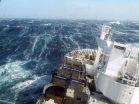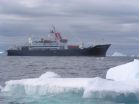(Press-News.org) The Southern Ocean has begun to absorb more atmospheric carbon dioxide (CO2) according to new research from an international team, including the University of East Anglia.
A decade ago scientists announced that the amount of CO2 being absorbed by the Southern Ocean had not increased since the late 1980s. And it was feared that this 'carbon sink' might have begun to saturate.
But new research to be published tomorrow (Friday) in the journal Science reveals that rather than stalling, the amount of CO2 being absorbed is on the rise again.
It is thought that changes in weather - particularly wind patterns and temperature - are responsible for this reinvigoration.
But the research team say that while this may look like good news for climate change, the effect could only be temporary and that future trends cannot be predicted reliably.
Dr Dorothee Bakker, from UEA's School of Environmental Sciences, said: "The Southern Ocean behaves like a giant lung - breathing in and absorbing vast amounts of carbon dioxide from the atmosphere, and releasing it later in the year.
"The seas around Antarctica absorb significantly more CO2 than they release. And importantly, they remove a large part of the CO2 that is put into the atmosphere by human activities such as burning fossil fuels. They basically help to slow down the growth of this greenhouse gas in the atmosphere and lessen the rate of climate change.
"We looked at what is happening in the Southern Ocean - which is responsible for capturing 40 per cent of the global oceanic uptake of man-made CO2.
"In the 2000s scientists pointed out that the Southern Ocean carbon sink might have begun to saturate. This was actually quite unexpected as it was previously thought that there would be a direct relationship between the amount of CO2 in the air, and the amount of CO2 absorbed by the sea.
"Research back then showed that the amount of CO2 captured by the Southern Ocean had not increased since the late 1980s.
"But our findings reveal that the tables have turned and that this carbon sink has reinvigorated over the past decade. It is much stronger - and it has in fact regained its expected strength."
Led by Prof Nicolas Gruber from ETH Zurich and his postdoc Peter Landschützer, who previously carried out PhD research at UEA, the research team analysed the concentration of CO2 in the surface waters of the Southern Ocean, available via the Surface Ocean CO2 Atlas (SOCAT). http://www.socat.info
This resource is coordinated by Dr Bakker, and the latest data collection (SOCAT version 3) was made public earlier this week - with 14.5 million surface water CO2 measurements from 1957 to 2014 taken from oceans and coastal seas around the world.
The surface CO2 concentration of the Southern Ocean is measured by research vessels, but data coverage depends on each ship's itinerary. As a result, certain regions of the ocean are very well sampled, while little or no data is collected for other regions. To fill in these gaps, the research team used a newly-developed method based on neural networks.
They compared the basin-wide surface ocean CO2 concentration with estimates based on measurements of atmospheric CO2. They also made use of satellite observations of sea water temperature, salinity and of the chlorophyll content.
The results clearly demonstrate that the Southern Ocean carbon sink began to revive around 2002. By 2010, its carbon uptake was once again comparable to the level expected on the basis of atmospheric CO2 increase alone.
This shows that the strength of the Southern Ocean carbon sink fluctuates strongly, rather than increasing monotonically in response to the growth in atmospheric CO2.
Prof Gruber said: "We were surprised to see such large variations in this ocean's net carbon uptake."
The research team say that changes in the prevailing weather patterns are responsible for the reinvigoration of the carbon sink.
Dr Bakker said: "Since the turn of the millennium, the dominant atmospheric pressure systems have changed, causing wind patterns to change too. In the 1990s, winds were stronger over the Southern Ocean, causing more water to be upwelled to the surface of the sea from the depth. But deeper waters contain higher concentrations of dissolved CO2 so this upwelling led to more greenhouse gases being released into the atmosphere and a reduction in the ocean's net carbon uptake.
"Since the turn of the millennium, upwelling has generally subsided, except in the Pacific sector, causing a reinvigoration of the Southern Ocean carbon sink. Our research also shows that a cooling of surface water in the Pacific sector has contributed to the change."
But the research team warns that future trends cannot be predicted reliably.
Dr Landschützer said: "Our statistical model is not able to predict the future development so it is critical that we continue measuring the surface ocean CO2 concentrations in the Southern Ocean.
"This is particularly important since current models are not able to reproduce the observed variations", added Prof Gruber. Hence, long-term datasets are the only reliable means for determining the future evolution of the ocean's sink for carbon.
Another factor that is not yet fully understood is the effect of large-scale climate phenomena such as El Niño and La Niña on carbon sinks. The reinvigoration in the Southern Ocean coincides with a period of prevalent La Niña conditions, as well as the so-called climate warming hiatus.
'Reinvigoration of the Southern Ocean Carbon Sink' is published in the journal Science on September 11, 2015.
INFORMATION:
This news release is available in Japanese.
Inconveniently, the only current method to synthesize the chemotherapy agent etoposide is by using extracts from a plant, but researchers have successfully manipulated Nicotiana benthamiana (tobacco) to create a more immediate and potent precursor. Etoposide is a topoisomerase inhibitor used to treat a variety of malignancies, including lung cancer and leukemia. There is currently no way to produce etoposide without one of its precursors, podophyllotoxin, which is found in the slow-growing Himalayan Mayapple plant. Four ...
This news release is available in Japanese.
In this Policy Forum, Jonas Meckling et al. discuss the need to close the gap between climate science and policy, arguing that targeted policies and economic incentives are the answer, rather than broad carbon taxes. As policymakers convene at the United Nations Climate Change Conference in December, pinpointing the best policies is critical for a more sustainable future. In theory carbon pricing poses as an efficient solution, but this has yet to be seen in practice. As the authors point out, carbon regulation imposes costs ...
This news release is available in Japanese.
Patients with metastatic melanoma who have benefited from a new type of cancer immunotherapy don't appear to share the same tumor-produced antigens, according to a new report by Eliezer Van Allen and colleagues. If the molecular targets for the immunotherapy differ from patient to patient, as this study suggests, it may be difficult to predict which patients will respond to the treatment. The drug, called ipilimumab, is part of a relatively new class of cancer treatments called immune checkpoint inhibitors. The inhibitors ...
This news release is available in Japanese.
The Southern Ocean has increased its uptake of atmospheric carbon dioxide again, after showing signs of slowing uptake in the 1990s, according to a new report from Peter Landschützer and colleagues. The Southern Ocean is a huge player in carbon sequestration, accounting for up to 40% of oceanic uptake of atmospheric carbon dioxide. When earlier studies showed the Southern Ocean's carbon sink weakening, the findings raised concerns that the planet might lose a powerful way to remove the growing amounts ...
Breathe in, breathe out, in, out... Like a giant lung, the Southern Ocean seasonally absorbs vast amounts of carbon dioxide (CO2) from the atmosphere and releases it back later in the year. But on an annual average the seas surrounding Antarctica absorb significantly more CO2 than they release. Most importantly, these seas remove a large part of the CO2 that human activities emit into the atmosphere, thereby slowing down the growth of this greenhouse gas in the atmosphere, lessening the rate of climate change. Although the Southern Ocean represents no more than a quarter ...
Berkeley -- To speed up progress in tackling climate change, policymakers need to build political support by investing in clean-energy industries rather than first penalizing polluters, according to a new policy paper by researchers at the University of California, Berkeley.
In the paper, to be published Thursday, Sept. 10, in the journal Science, a multidisciplinary team of environmental, political and legal experts finds that instead of emphasizing cap-and-trade schemes and penalties on greenhouse gas emissions - strategies considered to be most efficient by many economists ...
MENLO PARK, Calif. -- Some of the inner workings of Earth's subduction zones and their "megathrust" faults are revealed in a paper published today in the journal Science. U.S. Geological Survey scientist Jeanne Hardebeck calculated the frictional strength of subduction zone faults worldwide, and the stresses they are under. Stresses in subduction zones are found to be low, although the smaller amount of stress can still lead to a great earthquake.
Subduction zone megathrust faults produce most of the world's largest earthquakes. The stresses are the forces acting on ...
Researchers from the MRC Centre for Developmental Neurobiology (MRC CDN) at the Institute of Psychiatry, Psychology & Neuroscience (IoPPN), King's College London, have discovered a new molecular 'switch' that controls the properties of neurons in response to changes in the activity of their neural network. The findings, published in Science, suggest that the 'hardware' in our brain is tuneable and could have implications that go far beyond basic neuroscience - from informing education policy to developing new therapies for neurological disorders such as epilepsy.
Computers ...
WASHINGTON, D.C. - Since 2002, the Southern Ocean has been removing more of the greenhouse gas carbon dioxide from the atmosphere, according to two new studies.
These studies make use of millions of ship-based observations and a variety of data analysis techniques to conclude that that the Southern Ocean has increasingly taken up more carbon dioxide during the last 13 years. That follows a decade from the early 1990s to 2000s, where evidence suggested the Southern Ocean carbon dioxide sink was weakening. The new studies appear today in the American Geophysical Union ...
A prospective longitudinal study of U.S. Marines suggests that reduced heart rate variability - the changing time interval between heartbeats - may be a contributing risk factor for post-traumatic stress disorder (PTSD). The findings are reported in the September 9 online issue of JAMA Psychiatry by researchers at the University of California, San Diego School of Medicine and Veterans Affairs San Diego Healthcare System.
Even at rest, the normal rhythm of the heart fluctuates, reflecting influences and changes in other parts of the body. Generally speaking, the greater ...


